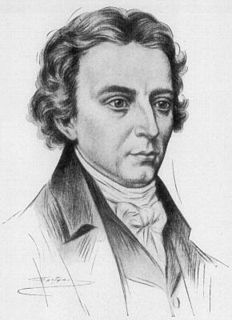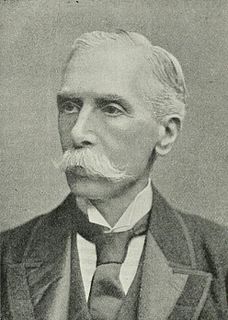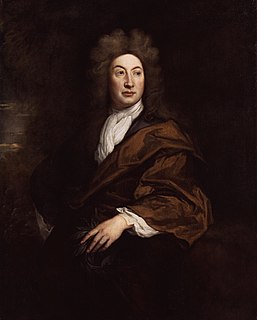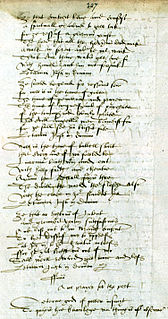Related Research Articles

A poet laureate is a poet officially appointed by a government or conferring institution, typically expected to compose poems for special events and occasions. Albertino Mussato of Padua and Francesco Petrarca (Petrarch) of Arezzo were the first to be crowned poets laureate after the classical age, respectively in 1315 and 1342. In Britain, the term dates from the appointment of Bernard André by Henry VII of England. The royal office of Poet Laureate in England dates from the appointment of John Dryden in 1668.

Alfred Tennyson, 1st Baron Tennyson was an English poet. He was the Poet Laureate during much of Queen Victoria's reign. In 1829, Tennyson was awarded the Chancellor's Gold Medal at Cambridge for one of his first pieces, "Timbuktu". He published his first solo collection of poems, Poems, Chiefly Lyrical, in 1830. "Claribel" and "Mariana", which remain some of Tennyson's most celebrated poems, were included in this volume. Although described by some critics as overly sentimental, his verse soon proved popular and brought Tennyson to the attention of well-known writers of the day, including Samuel Taylor Coleridge. Tennyson's early poetry, with its medievalism and powerful visual imagery, was a major influence on the Pre-Raphaelite Brotherhood.

John Dryden was an English poet, literary critic, translator, and playwright who was appointed England's first Poet Laureate in 1668.

Robert Southey was an English poet of the Romantic school, and Poet laureate from 1813 until his death. Like the other Lake Poets, William Wordsworth and Samuel Taylor Coleridge, Southey began as a radical but became steadily more conservative as he gained respect for Britain and its institutions. Other romantics such as Byron accused him of siding with the establishment for money and status. He is remembered especially for the poem "After Blenheim" and the original version of "Goldilocks and the Three Bears".
This article contains information about the literary events and publications of 1692.

Sir Andrew Motion is an English poet, novelist, and biographer, who was Poet Laureate from 1999 to 2009. During the period of his laureateship, Motion founded the Poetry Archive, an online resource of poems and audio recordings of poets reading their own work. In 2012, he became President of the Campaign to Protect Rural England, taking over from Bill Bryson.
John Kay may refer to:

Henry James Pye was an English poet, and Poet Laureate from 1790 until his death. His appointment owed nothing to poetic achievement, and was probably a reward for political favours. Pye was merely a competent prose writer, who fancied himself as a poet, earning the derisive label of poetaster.

Alfred Austin was an English poet who was appointed Poet Laureate in 1896, after an interval following the death of Tennyson, when the other candidates had either caused controversy or refused the honour. It was claimed that he was being rewarded for his support for the Conservative leader Lord Salisbury in the General Election of 1895. Austin's poems are little-remembered today, his most popular work being prose idylls celebrating nature. Wilfred Scawen Blunt wrote of him, “He is an acute and ready reasoner, and is well read in theology and science. It is strange his poetry should be such poor stuff, and stranger still that he should imagine it immortal.”

A makar is a term from Scottish literature for a poet or bard, often thought of as a royal court poet.

In English, the word laureate has come to signify eminence or association with literary awards or military glory. It is also used for recipients of the Nobel Prize, the Gandhi Peace Award, the Student Peace Prize, and for former music directors of orchestras who retain some level of involvement.
Grace Nichols FRSL is a Guyanese poet who moved to Britain in 1977, before which she worked as a teacher and journalist in Guyana. Her first collection, I is a Long-Memoried Woman (1983), won the Commonwealth Poetry Prize. In December 2021, she was announced as winner of the Queen's Gold Medal for Poetry.

Kay Ryan is an American poet and educator. She has published seven volumes of poetry and an anthology of selected and new poems. From 2008 to 2010 she was the sixteenth United States Poet Laureate. In 2011 she was named a MacArthur Fellow and she won the Pulitzer Prize.
Events from the year 1668 in England.
Nationality words link to articles with information on the nation's poetry or literature.
Events from the year 1877 in the United Kingdom.
Thomas MacDermot was a Jamaican poet, novelist, and editor, editing the Jamaica Times for more than 20 years. He was "probably the first Jamaican writer to assert the claim of the West Indies to a distinctive place within English-speaking culture". He also published under the pseudonym Tom Redcam. He was Jamaica's first Poet Laureate.

The British Poet Laureate is an honorary position appointed by the monarch of the United Kingdom, currently on the advice of the prime minister. The role does not entail any specific duties, but there is an expectation that the holder will write verse for significant national occasions. The origins of the laureateship date back to 1616 when a pension was provided to Ben Jonson, but the first official holder of the position was John Dryden, appointed in 1668 by Charles II. On the death of Alfred Lord Tennyson, who held the post between November 1850 and October 1892, there was a break of four years as a mark of respect; Tennyson's laureate poems "Ode on the Death of the Duke of Wellington" and "The Charge of the Light Brigade" were particularly cherished by the Victorian public. Three poets, Thomas Gray, Samuel Rogers and Walter Scott, turned down the laureateship. The holder of the position as at January 2022 is Simon Armitage who succeeded Carol Ann Duffy in May 2019.
Nationality words link to articles with information on the nation's poetry or literature.

Poetry of Scotland includes all forms of verse written in Brythonic, Latin, Scottish Gaelic, Scots, French, English and Esperanto and any language in which poetry has been written within the boundaries of modern Scotland, or by Scottish people.
References
- ↑ Chisholm, Hugh, ed. (1911). . Encyclopædia Britannica . Vol. 16 (11th ed.). Cambridge University Press. p. 282; see middle of first para.
W. Hamilton classes Chaucer, Gower, Kay, ......as “volunteer Laureates.”
- ↑ Howland, Frances Louise Morse (1895). The laureates of England: Ben Jonson to Alfred Tennyson. Frederick A. Stokes.
- ↑ "English Poets Laureate: First Versifier to Hold the Office was John Kay". The Pittsburgh Press. 17 February 1902. p. 7.